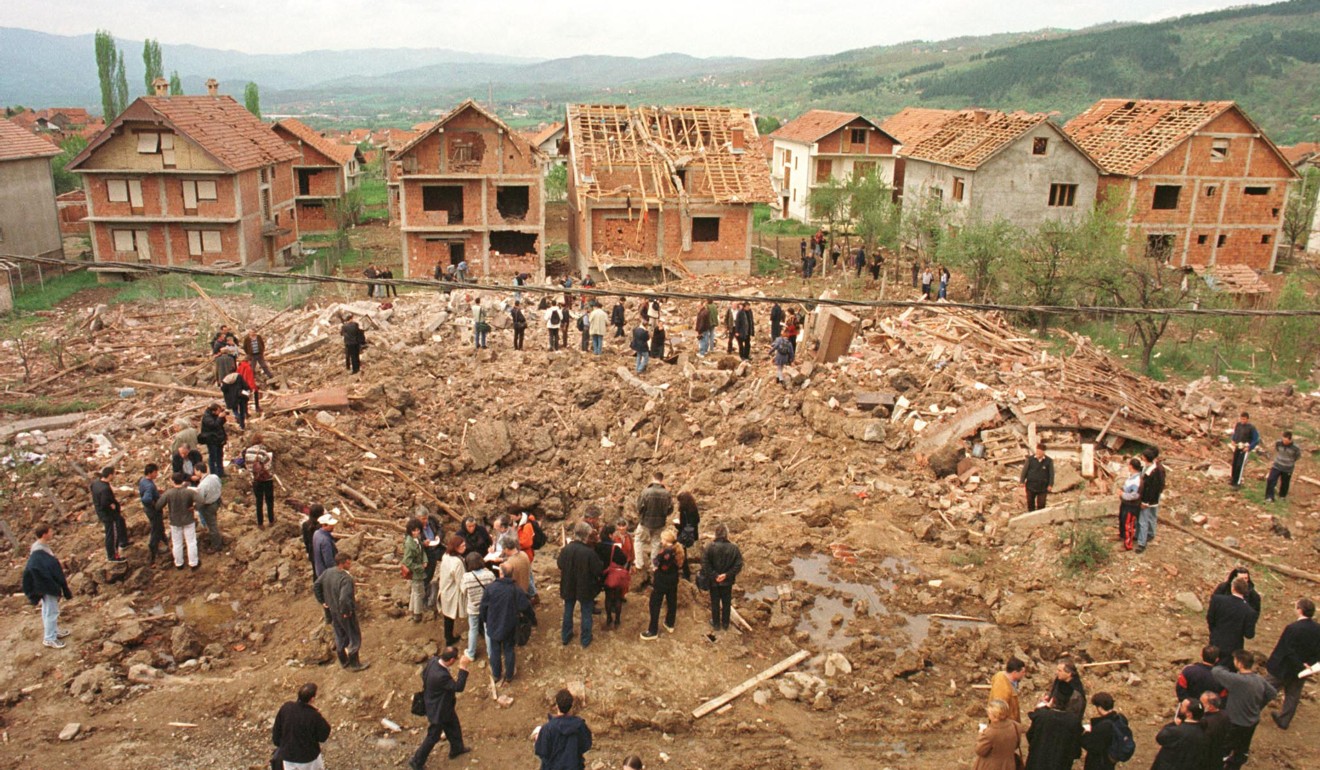
Serbian victims feel forgotten 20 years after Nato ‘mistakenly’ bombed them
- Hundreds of civilians were killed by the Western alliance’s bombs but nobody has been held accountable, their relatives complain
On the outskirts of the southern Serbian town of Surdulica a black cross looms above a grave covered in weeds.
This is the final resting place of some of the hundreds of civilians killed by Nato air attacks launched 20 years ago this Sunday, a tragedy survivors feel is as forgotten as the overgrown burial ground.

“No one except for journalists has called us or asked if we need any help, how we feel. Nobody,” said 34-year-old Ivana Mitic.
Mitic’s brother, grandmother, uncle, aunt and cousins died when a Nato bomb razed their home in Surdulica on April 27, 1999, in what the alliance later admitted was a “mistake”.

Nato’s three-month bombardment was said to be an effort to stop Serbian strongman Slobodan Milosevic’s crackdown on separatist ethnic Albanians in Kosovo, a southern province that later declared independence.
On its 20th anniversary, many will celebrate the intervention for having ended the final war in which 13,000 were killed, mostly Kosovo Albanians.
But in Serbia the air strikes left a trail of death and trauma.
For 78 days, Nato aircraft bombed Serbian military and civilian targets across the country, killing some 500 civilians according to Human Rights Watch.

The civilian deaths were never investigated by international courts, despite rights groups saying some incidents could have been war crimes.
Mitic was 14 at the time of the bombings. Her parents were only able to identify the nine dead by clothes, jewellery and shoes pulled from the rubble of their house, she recalled.
“Nobody has ever come to tell us who is accountable for that crime,” she added, trembling at the memory.
The bomb that crushed Mitic grandfather’s house was one of numerous “errors” Nato admitted afterwards.
A spokesman for the alliance said: “One bomb went astray … Things like this can happen and in fact they happened.”
Bosnian Serb police arrest grieving father, who is demanding truth about son’s murder
A month later on May 30, 1999 on the other side of Surdulica, 21 more people were killed when Nato fired on a nursing home.
Retired doctor Miroslav Stosic, 71, was one of the rescuers who arrived at the “horrible scene” strewn with dismembered bodies.
“We stood here for the entire night and tried to protect the remains” from stray dogs, he said.

Most of the victims were refugees from Croatia.
According to Stosic, they were swapped for soldiers previously based there.
Nato launched Operation Allied Force, without backing from the UN Security Council, after Milosevic refused to sign a peace deal to end the war.
Among the mistakes Nato admitted to was a strike on the Chinese embassy in Belgrade that killed three people. The US claimed outdated maps led the pilot to the wrong target.
In another case, Nato launched two laser-guided bombs at a railway bridge over Grdelicka gorge in southern Serbia, killing at least 10 people on a train.

There was also the highly controversial strike on the state television broadcaster RTS in Belgrade in April 1999, which killed 16 civilians.
Nato insisted it was a military target because it was broadcasting propaganda.
Amnesty International argued the bombing was a war crime, but UN prosecutors in 2000 decided not to investigate.
Many Serbs still harbour some hostility towards Nato and – unlike its Balkan neighbours – the country has no intention of joining.
The horror: why Srebrenica survivors say no punishment can be enough for Ratko Mladic, the Butcher of Bosnia
In Belgrade, some buildings still bear the damage of the bombs, while activists have hung banners in the city centre bearing the faces of the victims.
As well as Nato, Mitic blamed the Serbian state for her family’s deaths. The authorities failed to protect them, she said.

“Nobody has said ‘We are sorry, we made a mistake, we did not know that civilians were there’,” Mitic said through tears.
The only survivor of the bomb that struck that house, 81-year-old Stojanca Petkovic, lives around the corner.
“I would rather it had been me gone and one of these kids had survived,” he whispered.

.png?itok=arIb17P0)